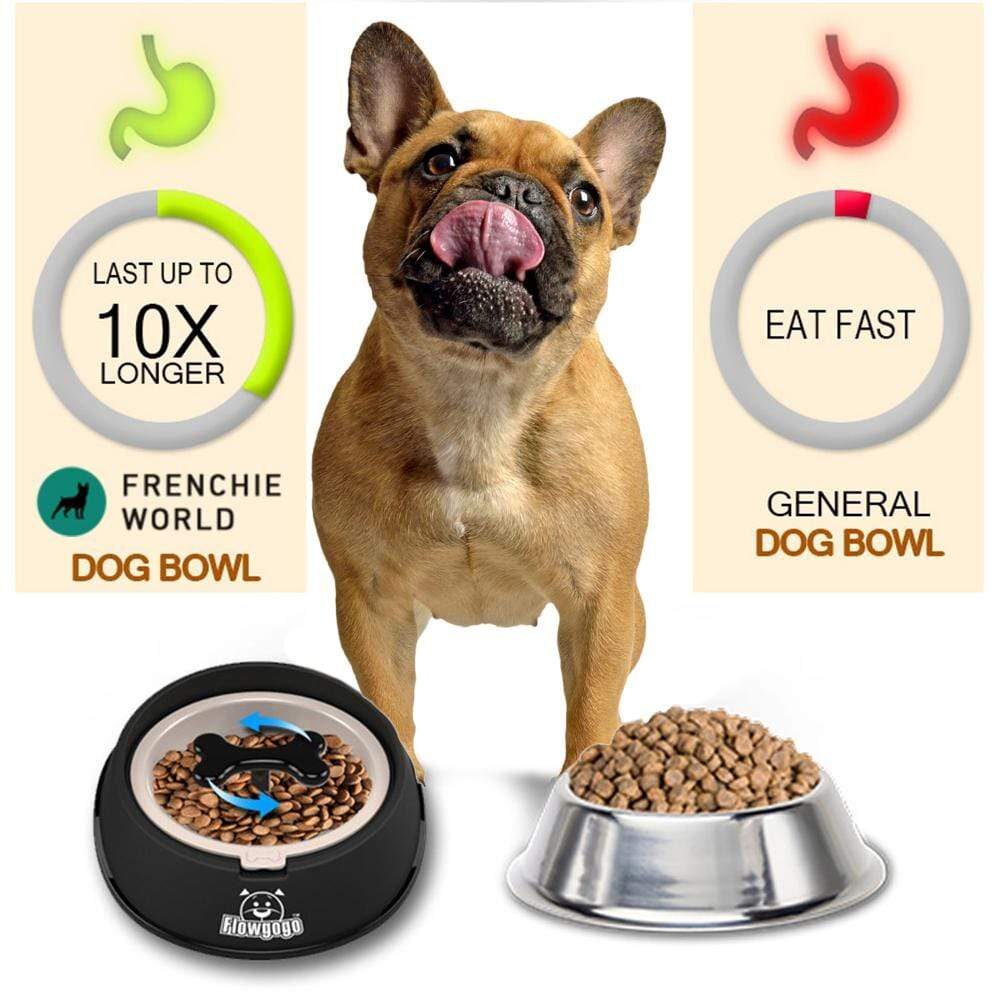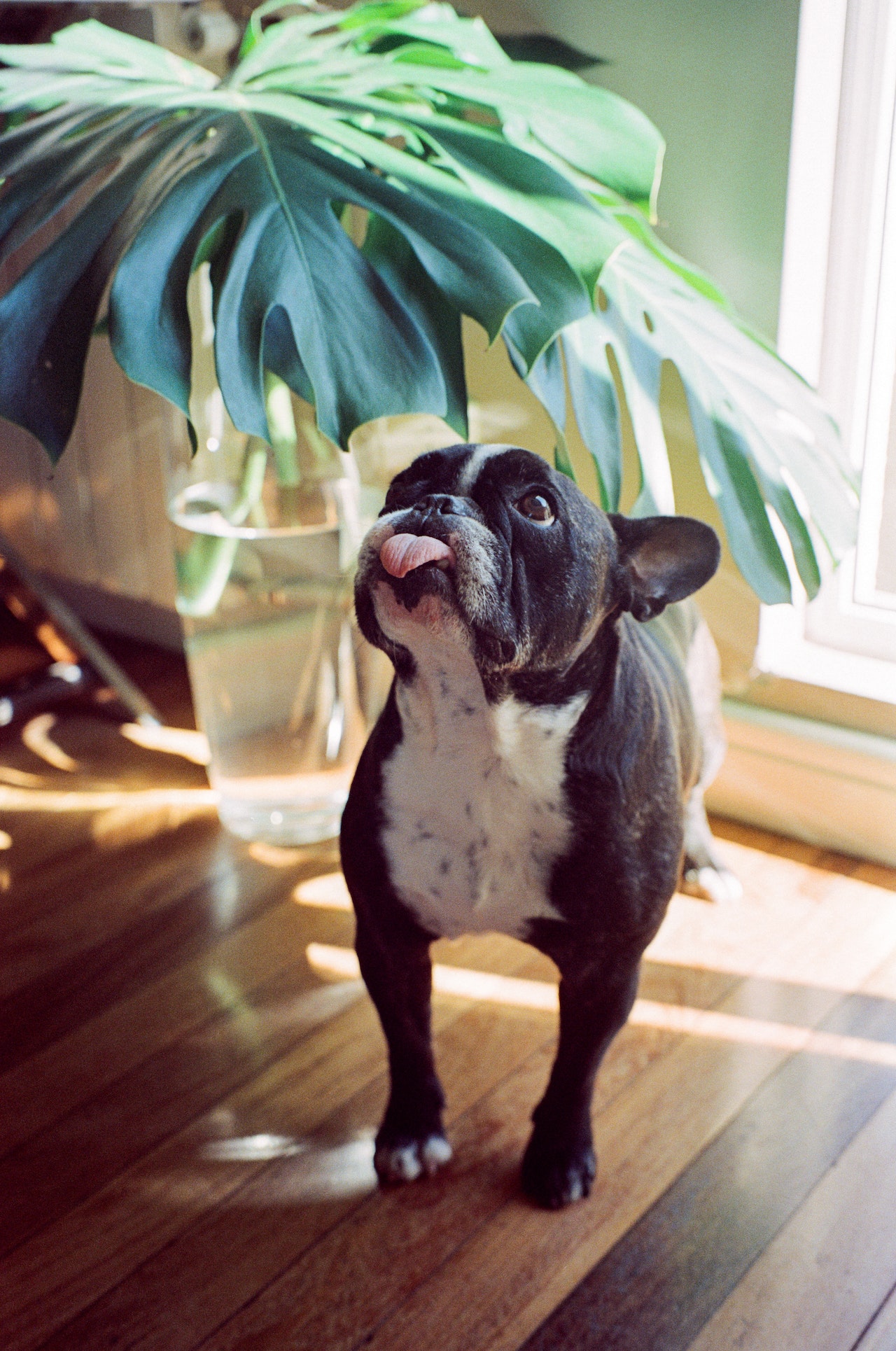If you notice your French bulldog throwing up, don’t worry too much as it can happen occasionally. Dogs, including Frenchies, may vomit due to various reasons. However, if your pup continues to vomit and does so more than three times in a row, it’s best to take them to a vet as soon as possible. They’ll be able to provide the necessary care and advice to ensure your furry friend is feeling better in no time.
Why Does My French Bulldog Keep Throwing Up?
It’s important to know that vomiting in French bulldogs isn’t always a cause for concern and can happen for many reasons. However, there are times when it’s crucial to seek help from a veterinarian if your Frenchie is vomiting repeatedly.
This guide is here to assist you in discovering the reasons behind your Frenchie’s vomiting and how to identify the different types of this condition. You’ll also learn what actions to take in case of your French bulldog throws up and when it’s essential to call a vet for help.

How To Recognize My Frenchie is About To Throw Up?
When a French bulldog appears to be about to vomit, it experiences a period of nausea during which it may seem agitated..
Your pooch might lick its lips, drool, and swallow repeatedly. Vomiting itself involves strong contractions of the stomach muscles, resulting in the expulsion of liquid, foam, or food.
It’s important to differentiate vomiting from regurgitation (food returning). Regurgitation is the expulsion of undigested food that has either just entered the stomach or is still in the esophagus. This often occurs when a French bulldog eats too fast and can reoccur shortly after a meal.
However, this isn’t as serious as vomiting in dogs.
If your French bulldog eats fast and looks as if swallowing air while eating, then you should use the Frenchie World® anti-choke slow eating & drinking bowl.
This French bulldog bowl is designed to slow down your dog’s eating pace and prevent choking while promoting healthy digestion. The unique feature of a rotating plastic bone in the center of the bowl encourages your furry friend to take smaller bites, allowing him to fully enjoy his meal while reducing the risk of choking.

My Frenchie is Throwing Up: What Could be the Reason?
Made from high-quality, food-grade plastic, this bowl is durable, easy to clean, and is suitable for dogs of all sizes. The non-slip base ensures that the bowl stays securely in place, preventing messy spills and making mealtime a breeze for you and your pup.
Characteristics that can help distinguish vomiting from regurgitation in dogs include:
- Vomiting usually involves stomach muscle contractions and effort
- Regurgitation typically occurs quickly without stomach muscle contractions
- Regurgitation often occurs right after eating.
Dogs of different ages, breeds, and behaviors may be prone to vomiting. Additionally, external or internal factors can influence vomiting in dogs.
Here is a list of possible causes of acute (short-term, sudden) or chronic (happens frequently over time) vomiting in dogs:
- Sudden changes in diet
- Bloating
- Brain tumor
- Cancer
- Constipation
- Diabetes
- Contaminated water
- Eating too fast
- Exercise after eating
- Food allergy or intolerance
- Gastritis
- Gastroenteritis (inflammation of the stomach and intestines)
- Gastrointestinal ulcer
- Head trauma
- Side effects of medication
- Heatstroke
- Infections (bacterial, viral, or fungal)
- Inflammatory bowel disease
- Toxins
- Intestinal parasites
- Kidney disease
- Liver disease
- Parvovirus
- Pancreatitis
Vomiting in dogs can be acute or chronic. Familiarize yourself with the reasons why a dog may suffer from acute and chronic vomiting.
French Bulldog Acute Vomiting
Acute vomiting is something that happens suddenly and doesn’t last long. Here are a few reasons that can lead to acute vomiting in dogs:
Spoiled or Toxic Food
If a dog eats spoiled food or a toxic plant, it can lead to acute vomiting. If the food a dog eats is extremely fatty, it can lead to another serious stomach problem called pancreatitis.

Infectious Diseases
Vomiting in dogs can also be caused by certain infectious diseases, which are more common in younger dogs or even puppies.
One cause of vomiting in dogs from an infectious disease is parvovirus, which can be very serious. It is most commonly found in puppies who are in the vicinity of other dogs.
Some breeds may be more susceptible to parvovirus, including Rottweilers, German Shepherds, Retrievers, and Labradors.
Parasites
Parasites can also cause vomiting in dogs. A dog often has parasites without you knowing it. Then suddenly, they can start showing symptoms like vomiting.
Contaminated Water
Contaminated water can cause stomach upset in dogs. Drinking from a lake with cyanobacteria (blue-green algae) can be deadly. In dogs, vomiting may be the first symptom, but severe cases can progress to neurological problems and death.
Bloating in French bulldogs
Vomiting can cause bloating, which is an acute and life-threatening condition that requires hospitalization and aggressive treatment for the dog.
If the stomach fills up with air, it can interrupt circulation and cause shock in dogs. This condition most commonly occurs in large breed dogs, including German Shepherds, Great Danes, Labradors, and Golden Retrievers. On the other hand, it can also occur in brachycephalic dog breeds such as Pugs and Frenchies because they can’t reach food from the bowl properly, so they also ‘eat’ the air while eating. If a dog eats or drinks too quickly, it can lead to bloating.
Frenchie Chronic Vomiting
Chronic vomiting is a long-lasting and frequently occurring condition. Seeing your French bulldog throwing up chronically can be frustrating, especially if you don’t know the underlying cause. Chronic vomiting in young dogs is often due to parasites or food sensitivities. It can also be caused by certain diseases or health problems in dogs. X-rays, ultrasounds, or biopsy are often needed to diagnose the problem. Here are a few of the most common causes of chronic vomiting in dogs:
Megaesophagus
The Megaesophagus, which is the enlargement of the esophagus, can be caused by a range of conditions that can affect dogs of all ages. Some dogs may be born with this condition because their esophagus is formed that way, while other dogs may develop this problem later in life due to certain health issues.
Inflammatory Bowel Disease
Chronic vomiting can also be caused by inflammatory bowel disease.
Pancreatitis
We mentioned pancreatitis as an acute cause of vomiting in dogs. However, some dogs suffer from chronic pancreatitis, which makes them prone to constant vomiting.
French Bulldog Throwing Up, Different Vomit Types
Once you’re fairly certain that your furry friend is throwing up, you can identify the type of vomit by its appearance and color. This is crucial as it can help determine the cause of vomiting in Frenchies.
French Bulldog Throwing Up Yellow
Yellow vomit in French bulldogs is a very common occurrence when the stomach is empty. The yellow color occurs due to bile secretion and usually happens in the middle of the night or early morning hours. It can be caused by acid build-up or any other systemic condition that causes nausea on an empty stomach.
White and foamy vomit in dogs can be caused by stomach acid accumulation. Clear and liquid vomit in dogs can be due to stomach secretion or when water accumulates in the stomach, which often happens when a dog drinks water while feeling nauseous.
French bulldog Throwing Up Blood
Vomiting blood in dogs is always a serious matter. If the content is not red and vomiting is not prolonged or copious, a pinkish shade may not be a cause for alarm. However, if there are blood clots or fresh blood, it may indicate bleeding in the stomach or upper part of the small intestine. Ulcers, tumors, or poisoning can cause bleeding, which requires immediate veterinary attention.
French Bulldog Throwing Up Brown
Brown vomit in dogs can indicate undigested food from the esophagus or that the dog ate too quickly and didn’t chew its food properly. However, sometimes it can indicate a more serious health issue. Examining the vomit content can help determine the nature of the problem.
French Bulldog Throwing Up Green
Green vomit in dogs can result from the dog eating grass, but it can also be due to gallbladder constriction before vomiting.
French Bulldog Throwing Up Worms
Parasite infection can also be one of the reasons for your French bulldog’s vomiting. For instance, most intestinal parasites initially do not display any signs of illness.
However, when the infection becomes severe, the most common symptoms of parasite infestation in dogs are discomfort and changes in stool (usually resulting in diarrhea). Aside from mild symptoms, parasites can also cause problems like anemia, skin diseases, infections, difficulty breathing, refusal of food, and loss of appetite. If you notice any of the aforementioned symptoms, it’s crucial to seek veterinary help. The sooner the treatment starts, the less severe the consequences of the parasite infestation will be for the dog.

When To Take Your French Bulldog to The Vet?
Determining the appropriate time to seek veterinary care for your French bulldog is of utmost importance. If your pet experiences vomiting lasting for less than 12 hours and displays lively behavior while still eating and drinking normally, it may not require immediate medical attention. Nevertheless, it is advisable to exercise caution and keep a close eye on the situation.
Dehydration poses a significant risk for dogs experiencing vomiting episodes. Therefore, it is essential to consult a veterinarian if your French bulldog:
- is a puppy or senior dog
- is trying to vomit or shows signs of bloating, which can be life-threatening
- is vomiting blood
- is vomiting pieces of a foreign object
- is lethargic
- is urinating less, which is a sign of dehydration
- has a swollen abdomen (observed in more serious causes of vomiting)
- is refusing food
- shows signs of dehydration (skin does not return to its place after being gently pulled, dry gums)
- has diarrhea with vomiting (which can quickly lead to dehydration)
- already has existing health problems
- is vomiting frequently (chronic vomiting)
- is losing weight due to vomiting
Things to watch out for that may also require urgent veterinarian visits include:
- vomiting accompanied by diarrhea (especially if it becomes bloody) indicates a situation that can quickly lead to serious dehydration that may result in the need for hospitalization
- the dog becomes lethargic after vomiting. This could be a result of severe stomach pain or cramps due to electrolyte imbalances. You do not want to wait too long without veterinary help
- your dog eats a foreign object, rodent poison, or something you suspect is toxic. If you are not lucky enough to prevent your dog from eating a foreign object or something toxic, you can immediately notify the veterinarian of what it was and find out what steps you need to take.
If your dog vomits once and then continues with their usual activities and eats normally, there is likely no need for concern.
If your dog vomits repeatedly or the vomiting recurs, you must immediately call a veterinarian. If the dog is also lethargic, it is clear that the situation is serious.
Vomiting can be a symptom of many serious illnesses and complications, and as a responsible dog owner, you have to react on time.
Ignoring vomiting in French bulldogs can have serious, even fatal consequences.
Determining the cause of the French bulldog throwing up usually requires several steps. The veterinarian will ask you questions about your dog’s access to garbage, poisons, and toxins, recent changes in their diet, and whether your pet is showing any other symptoms.
The veterinarian will then perform a physical exam. If the veterinarian deems it necessary, they will perform all additional tests, such as blood tests, ultrasound, X-ray, endoscopic analysis, biopsy, and urine tests.
How to Prevent Frenchie Vomiting?
Many causes of vomiting in Frenchies cannot be prevented, but a smaller number can be prevented if you follow these rules:
- Do not change your dog’s diet suddenly. Always use a gradual approach. Sudden changes in diet are a common cause of gastrointestinal problems in dogs.
- Do not give your dog toys that can be swallowed or chewed, as this can cause irritation or blockage of the gastrointestinal tract.
- Do not give bones to your dog. They are also routinely implicated in episodes of vomiting.
- Avoid giving human food to your dog. Some human foods are truly dangerous for dogs (e.g., grapes, raisins, chocolate, onions, garlic, and high-fat foods).
- Do not allow your dog to search for food during walks or have access to garbage cans.

